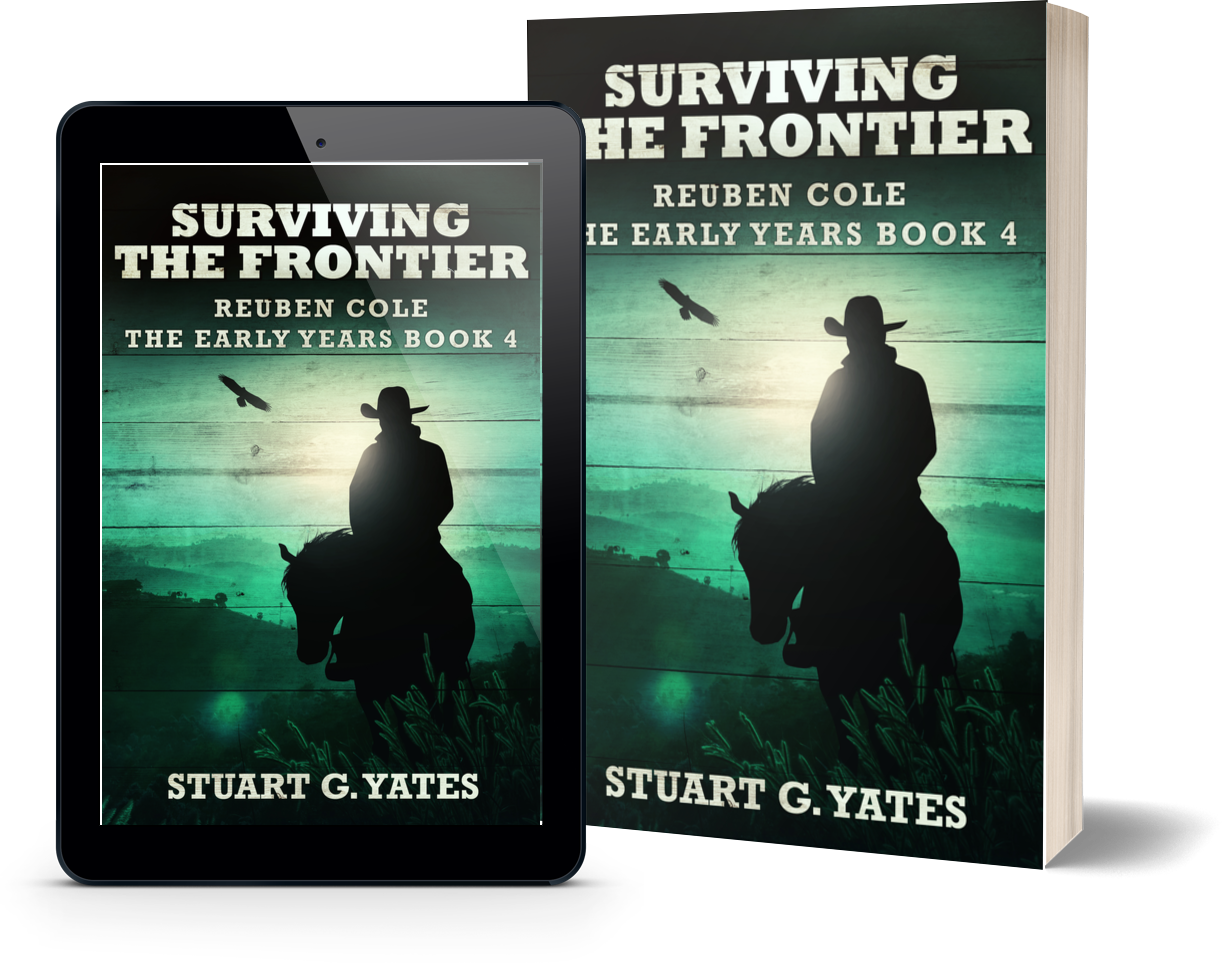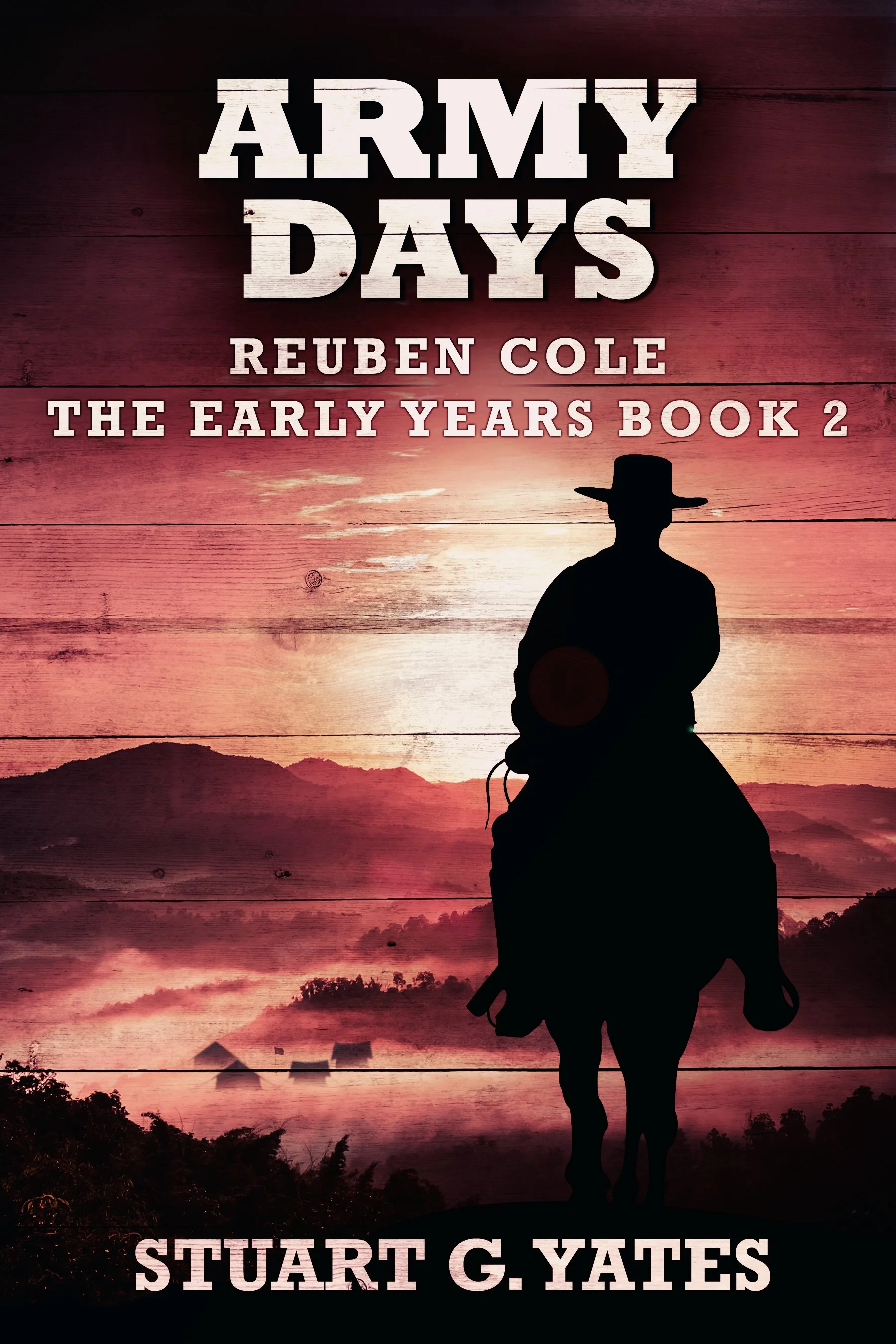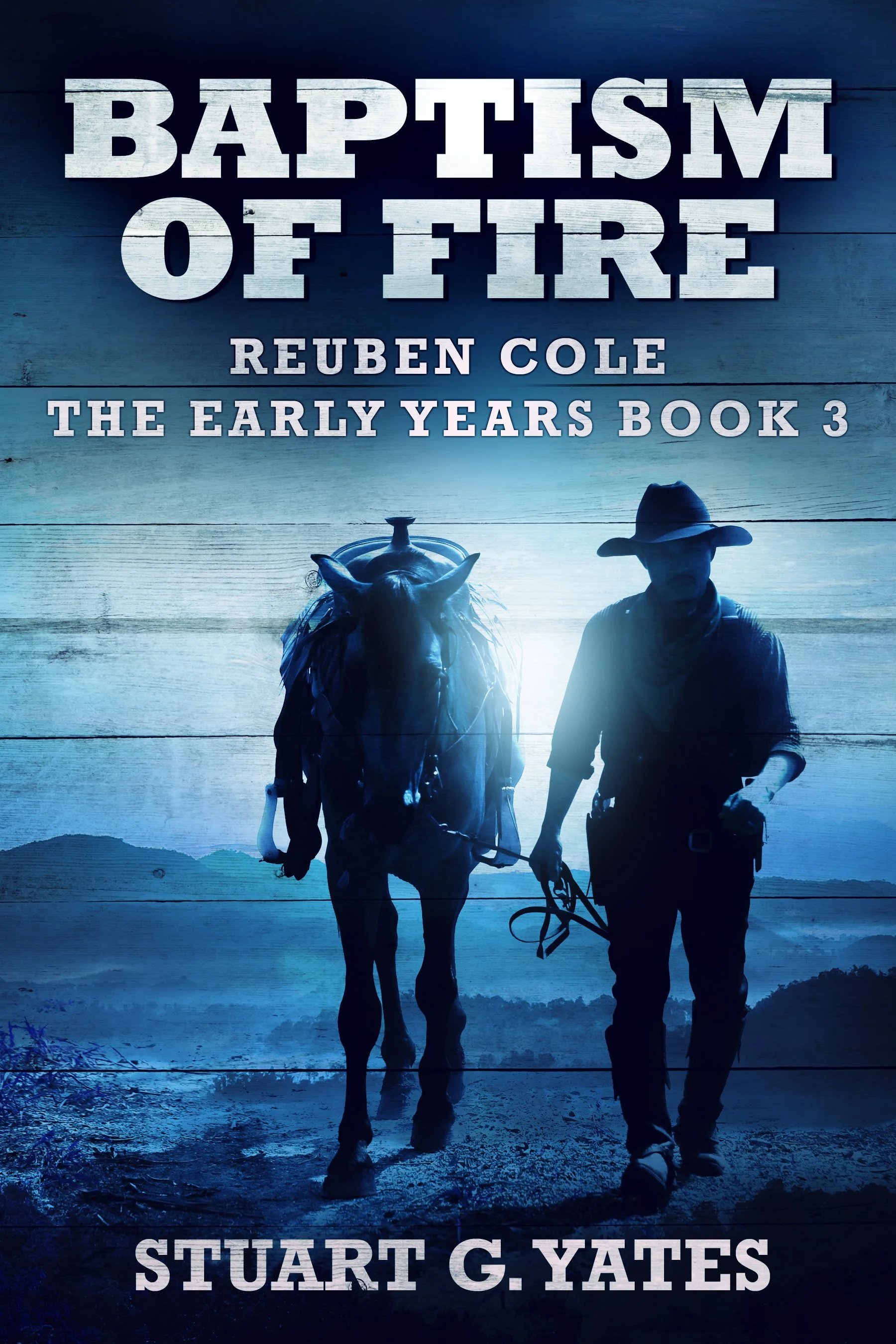Surviving The Frontier (Reuben Cole - The Early Years Book 4)
Book summary
"Surviving The Frontier" by Stuart G. Yates takes readers on a gripping journey through the tumultuous aftermath of the Civil War. Follow Reuben Cole, a Union scout turned Confederate renegade hunter, as he forges an enduring alliance with legendary tracker Sterling Roose. Together, they confront notorious outlaws, including the elusive William Quantrill, and the feared Union raider Edwin Terrell. With relentless pursuit and inevitable showdowns, this fourth installment in the Western series delves into the gritty and gun-filled early years of Reuben Cole.
Excerpt from Surviving The Frontier (Reuben Cole - The Early Years Book 4)
There were bodies in the yard, stacked up on the bed of an open wagon. Perhaps a dozen or so corpses, faces green and tight with the rictus of death, other exposed flesh blackened by the sun. And by the blood. Uniforms burst open, hands frozen in the act of clawing for a moment more of life. From under the shade of the commanding officer’s quarters, Reuben Cole leaned against the supporting post and let out a long sigh.
He wished, more than anything, that this horrible war was done. For too long, the country had been ravaged by battles and soaring casualties. Sometimes, it occurred to him that the world truly was a terrible place, with life nothing more than a fleeting moment filled with pain. He was twenty-one years old but the horrors he had so far witnessed gave him the outlook of a forty-year-old steeped in loss and despair.
Some time ago, an elderly subaltern had taught him how to smoke, telling him a man should smoke, especially at the end of the day, in the quiet of the evening. “To look back on what you experienced, to think and learn from everything you went through,” the old man had said.
Up until now, Cole had had no opportunity to dwell on anything in the quiet of an evening. Constantly on duty, either foraging or tracking, he longed for a period of calm, to put into practice the truth of the old man’s words. He pondered them now, quietly rolling himself a cigarette as he stood in the shade and looked at those corpses and the party of colored soldiers unloading them. He glanced up when a grim-faced sergeant sidled up to him.
“Renegades,” he said. “Caught up with them near a sordid little town called Springwater.” He scoffed. “Can you believe that? Springwater? A more filthy, disgusting place I have yet to see.” He leaned forward and spat out a long line of tobacco. “And I’ve seen a lot, I can tell you that much.”
“How much longer do you think this war is gonna go on for, Sergeant?”
He ruminated on the wad of tobacco in his mouth for a moment. “For as long as it takes, I suppose. I thought that after Gettysburg, the Rebs would give it up but, as we all know, they didn’t. Them boys”—he pointed to where the limp stack of Confederate corpses waited— “are only the first. The Rebs ain’t gonna give this up without a long fight, and it won’t all be in neatly laid out lines of men shooting the bejesus out of one another. It’ll be raiders like them, bringing merry hell down on poor folk, most of ‘em coloreds I shouldn’t wonder. Nah, this ain’t gonna be finished for a long while, I can tell yeh.” He spat out another stream of juice.
If Cole wasn’t feeling depressed before hearing the sergeant’s words, he was now! He blew out a long sigh.
The door behind them creaked open and Lieutenant Sullivan emerged, hat in hand, using a handkerchief in his other to mop the sweat covering his pale brow. Cole and the sergeant brought themselves to attention.
“At ease,” said Sullivan distantly, waving them aside with his handkerchief. Gazing across the yard to the wagon, he uttered a woeful moan. “Damn, do they have to bring them back here?”
“Can’t very well leave them to rot out in the prairie, sir. We should give ‘em a Christian burial.”
“Christian?” The lieutenant shook his head and carefully repositioned his hat. “There isn’t anything Christian about what those men did, Sergeant Brothers—which reminds me. Captain Johns wants to talk to you tomorrow morning after reveille, Cole. Have your horse and equipment ready as you will be leaving shortly after.”
“Leaving? Leaving for where, sir?”
“I’ll let the Captain tell you the details, Cole.” He gave a lazy flick of his hat brim by way of a salute and swaggered down the steps, calling out unnecessarily to the men unloading the bodies as they were just about finished, “Hurry along, men. Those pesky flies are putting me off my breakfast.”
Cole watched him go. “What do you think they have in mind now, Sarge?”
Brothers shrugged. “Blown if I know, Cole. There is rumors of more mischief across in Arkansas and some mean-looking boys rode into town late last night. They didn’t speak to no one, but I’m guessin’ their arrival has something to do with what the Captain wants to speak to you about.”
***
It was later, in the fort saloon filled with off-duty soldiers, that Cole spotted the small group of men that Brothers had spoken about. They were indeed a rough-looking crew, dressed in filthy greasy buckskins, frilled at the edges, and sporting tied-down guns at their hips. It was the hard scowls that took most of Cole’s attention. They averted eye contact with anyone, dead eyes set on the table around which they sat, playing cards, tiny stacks of coins in front of each man.
“They is scouts,” said Henshaw, the barkeeper, leaning across the counter. He kept his voice low as he spoke. “You ever seen such a bunch in all your days, Cole?” He laughed at that. “I mean, in all your young life?”
“Not particularly.”
“I heard it say they is the bunch who under Cox caught up with Anderson up in Missouri late October of last year,” added a private, hard-featured, lean. He did not look at the group, keeping his concentration firmly fixed on his beer glass. “Imagine that. Bloody Bill Anderson, and right there are the men who killed him.” Shaking his head, he drained his glass. “We is in the company of heroes, gentlemen.”
“If it’s true,” said Henshaw. “I have heard it say that Anderson got out alive and is still terrorizing folk.”
“Nah,” said the soldier, shaking his head. “I seen the photographs.” He turned and looked at Cole. “You had your photograph taken, Cole? You should. Got mine done not long after enlisting and sent it back to my mammy. She was so proud. What color hair you got?” He peered at the few strands of hair sticking out from under Cole’s hat. “Is that blond, Cole? You got blond hair?”
“Injun scouts call it yellow.”
“You will have to dye it. If you get your photograph took, your blond hair won’t show up. You will look bald.” He sniggered. “My mammy, she wrote me, asking me why I now had black hair. Like a negro.” He slapped the counter and laughed uproariously. “Imagine that! My mammy thinking I have become a black man. Give me another beer, barkeep.”
Shaking his head, Cole turned away. Convinced that the men in the corner would be the ones Johns would introduce him to the following day, he left the saloon without another word and went straight to his billet.
Sergeant Butcher gave Cole a cursory nod as the young scout came into the Captain’s office the following day. As yet, Cole had not eaten breakfast and he was conscious of his stomach rumbling. He prayed no one else would notice.
Captain Johns stood behind his desk, unlit cigar clamped in his mouth, leaning over his desk and tracing a finger across a large map. Flanking him were two of the rough-looking men that Cole had seen the night before. They appeared as before—bearded, dirty, festooned with guns. They looked at Cole from beneath bushy brows but did not speak.
“Cole,” said Captain Johns, “we have some news.” He straightened. “These good men were part of the squad that cornered Anderson. I suppose you heard about that?”
“Yessir. Only last night, a young—”
“Over in Missouri, a hothead called Dave Poole surrendered to our forces. He told our men some interesting things, especially about a gang of vagabonds led by Archie Clement. Seems they are a splinter group of Andersons. Well, they have splintered also, and a mob led by a man called Randolph ‘Curly’ Brookes has ridden into Arkansas and begun raiding small towns and farms.”
“Arkansas is still a Confederate state, is it not?”
Johns gave him a long look. “Partly. Not for much longer though.”
“You a tracker, son?”
Cole turned to address the man who asked him the question. He was a fine-looking fellow, broad across the shoulders, but his facial features were difficult to make out due to the huge beard he sported. With his hat placed on the desk in front of him, his long hair fell to his shoulders. But his eyes were clear, and they burned with barely controlled ferocity.
“I am, yes … Mister …?”
“Name’s Roose,” said the man. “I am also a tracker. Learnt all I know from that gentleman over there.” He gestured towards the man flanking John’s right shoulder. “His name is Jim Two-Feathers and he is half-Apache. You got anything against Injuns, son?”
“Name is Cole. Reuben Cole.”
“All right, I’ll try again. Reuben Cole, you got anything against—”
“No, I haven’t. Some of my best friends are Indians.”
“That’s good because you will be riding with us and we have a good ways to go. The three of us will scout ahead of the main troop led by Brothers. It will be a six-man squad.”
“That’s not many.”
“Any more will attract undue attention,” explained Johns, “and we don’t want that. The squad will be led by Butcher, but Mr Roose here will be in overall command. What he says goes; you understand, Cole?”
“Yessir, of course, sir.”
“Brookes crossed into Arkansas from Missouri with a troop of Federal militia hot on his trail. He cornered them close to Norfolk Lake. Shot them all dead, save one. They stripped him naked, hung him from a tree and tortured him until he told them everything they needed to know. He lived. That’s how we know.”
“They let him live?” Cole was shocked. “Why would they do that?”
“To send a message,” put in Johns, “warning anyone else who cares to take them on that a similar fate awaits them. These are a particularly nasty bunch of bushwhackers, Cole, and we fear that they will soon turn to bank robberies. We have to find them and put a stop to their deprivations.”
Cole did not have to ask what that last sentence implied.
“You up to that, Reuben Cole?”
Meeting Roose’s hard stare, Cole nodded. “I am, yes, sir.”
“Good. We leave in the evening. Better to travel in the cool than in this heat.”
“Have to tell you, Cole,” said Johns, standing straight. “Reports are also coming in of Cherokees causing all sorts of mischief along the borders, so keep your wits about you. I want this business settled and I want you back here in one piece. This war is not going to last much longer, I can tell you that much, and once it is over, we will need good men like you to help us rebuild and reestablish trust among the local populations, especially in Texas. So, do your duty and return. That is all.” And then Johns did something completely out of character: he smiled. “And get yourself some grub, Cole. The sound of your guts would alert a deaf coot, never mind a bunch of blood-thirsty Cherokees.”

















Praesent id libero id metus varius consectetur ac eget diam. Nulla felis nunc, consequat laoreet lacus id.